Table of Contents
- The Difference: Optimized WooCommerce Hosting vs. Standard WordPress Hosting
- Conclusion
-
+ FAQs
- What specific performance metrics should WooCommerce store owners prioritize when choosing a hosting provider, and what are considered good target values for these metrics?
- Beyond SSL certificates, what specific security features should a robust WooCommerce hosting provider offer to protect online stores and customer data?
- How do scalability challenges differ for WooCommerce stores compared to regular websites, and what hosting features specifically address these challenges?
- Why is a staging environment particularly important for WooCommerce stores, and what features should store owners look for in a hosting provider’s staging tools?
- For WooCommerce store owners who require customization and development flexibility, what developer-friendly hosting features are most valuable?
- What is the difference between managed and unmanaged WooCommerce hosting, and which type is generally more suitable for different types of store owners?
Think of your WooCommerce hosting as your store’s digital real estate. A slow, unreliable host is like setting up shop in a neglected building with spotty power – it’s a guaranteed way to frustrate potential customers. Conversely, selecting the right WooCommerce hosting provider is like securing a prime storefront in a thriving digital marketplace – it positions you for long-term success.
Here’s why it matters:
- Speed is king: Studies show that over 53% of online shoppers in 2025 will abandon a site if it takes longer than 3 seconds to load. Fast hosting is essential.
- Security = Trust: With data breaches on the rise, customers prioritize secure online stores. Top-tier WooCommerce hosts offer advanced security features in 2025.
- Downtime is lost revenue: Every minute your store is down means missed sales. Look for hosts with a 99.99% uptime guarantee.
The Difference: Optimized WooCommerce Hosting vs. Standard WordPress Hosting
While you can technically run a WooCommerce store on standard WordPress hosting, it could be better. WooCommerce has specific needs when it comes to performance, security, and scalability. Here’s why specialized WooCommerce hosting makes a world of difference:
- Speed-Focused: WooCommerce sites have extra demands like dynamic product pages, shopping carts, and payment processing. Optimized hosting is engineered to handle these efficiently.
- Security-Hardened: WooCommerce deals with sensitive customer data. Specialized hosts have security measures tailored to protect these vulnerabilities.
- Scalability: Can your hosting handle sudden traffic spikes during sales or promotions? WooCommerce-focused plans are designed to flex with your needs.
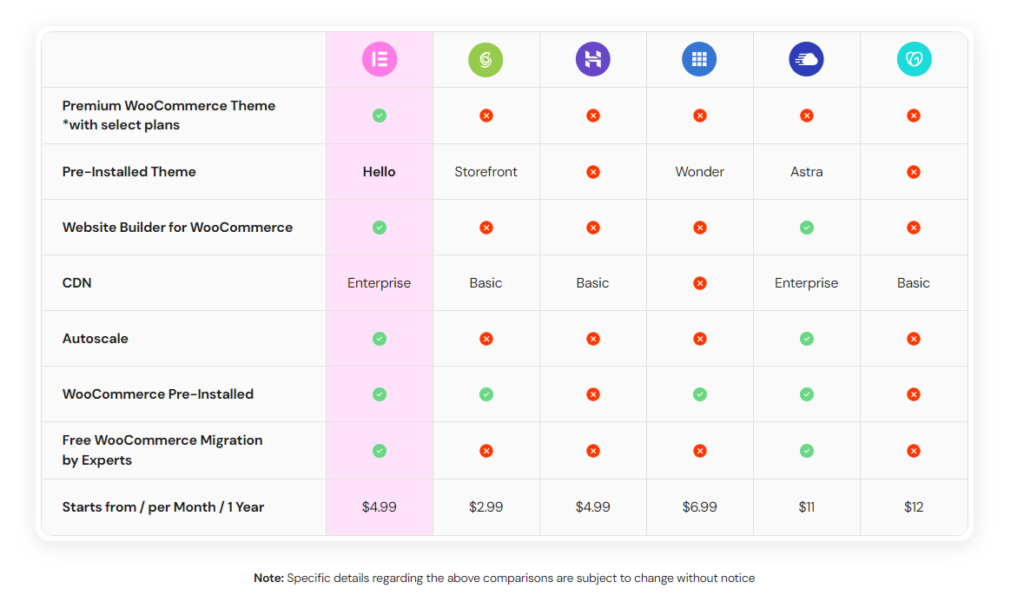
Why Optimized WooCommerce Hosting Matters
Speed: The Cornerstone of a Positive Customer Experience
In the world of e-commerce, every second counts. Studies show that even a one-second delay in page load time can lead to a significant drop in conversions, increased bounce rates, and lower customer satisfaction. Slow websites don’t just hurt sales; they also damage your brand reputation and can even negatively impact your search engine rankings.
So, what causes a WooCommerce site to slow down? Here are some common culprits:
- Inefficient Database Queries: WooCommerce stores rely heavily on their databases to store product information, customer data, and order details. Unoptimized queries can lead to slow loading times.
- Bloated Plugins: While plugins add functionality, more or better-coded plugins can significantly impact performance.
- Unoptimized Images: Large, uncompressed images can drastically slow down your site.
- Need for Server Resources: Shared hosting plans often need to provide more RAM, CPU, or bandwidth to handle the demands of a WooCommerce store.
How Optimized WooCommerce Hosting Tackles Speed Challenges
- Powerful Server Infrastructure: Optimized hosts use faster server types (VPS, dedicated, cloud), allocate more RAM and CPU resources, and use high-performance storage like SSDs.
- Caching: Caching mechanisms like object caching and browser caching store frequently accessed data in temporary locations, reducing the need to fetch it from the database or server every time.
- Content Delivery Networks (CDNs): CDNs distribute your website’s content across a global network of servers, ensuring that visitors get content from a location nearest to them, resulting in faster load times.
- Built-in Optimizations: Some WooCommerce hosting providers offer fine-tuned configurations and optimizations specifically geared towards WooCommerce performance.
Security: Safeguarding Your Store and Customer Data
WooCommerce stores handle sensitive information – customer names, addresses, credit card details, and order history. This makes them a prime target for hackers and cybercriminals. Security should be a non-negotiable priority when choosing your WooCommerce hosting.
Here are some key vulnerabilities specific to WooCommerce:
- Outdated Software: Old versions of WordPress, WooCommerce, plugins, or themes may contain known security flaws that hackers can exploit.
- Weak Passwords: Simple passwords are easy targets for brute-force attacks.
- Unsecured Payment Gateways: If your payment gateway isn’t secure, customer financial data is at risk.
- Malware and Injections: Malicious code can be injected into your site to steal data or even take it completely offline.
How Optimized WooCommerce Hosting Protects Your Store
- Proactive Security Measures: Specialized hosts offer features like firewalls to block malicious traffic, regular malware scanning, and automatic updates for WordPress, plugins, and themes to patch vulnerabilities quickly.
- SSL Certificates: SSL certificates encrypt the data transmitted between your website and visitors’ browsers, protecting sensitive information in transit.
- Backup and Restoration: Regular backups ensure you can recover your store in case of a hack or data loss. Disaster recovery plans minimize downtime if something goes wrong.
- Security Expertise: WooCommerce-focused hosts have teams well-versed in the specific security threats facing e-commerce stores, providing an extra layer of protection.
Beyond the Basics: Additional Security Considerations
Even with a secure host, it’s wise to practice vigilance. Consider these tips:
- Use Strong Passwords: Make them long and complex, and change them regularly.
- Choose Secure Plugins: Research plugin reputation, look for regular updates, and avoid abandoned plugins.
- Two-Factor Authentication (2FA): Adds an extra layer of security to your login process.
Grow Your Sales
- Incredibly Fast Store
- Sales Optimization
- Enterprise-Grade Security
- 24/7 Expert Service

- Incredibly Fast Store
- Sales Optimization
- Enterprise-Grade Security
- 24/7 Expert Service
- Prompt your Code & Add Custom Code, HTML, or CSS with ease
- Generate or edit with AI for Tailored Images
- Use Copilot for predictive stylized container layouts

- Prompt your Code & Add Custom Code, HTML, or CSS with ease
- Generate or edit with AI for Tailored Images
- Use Copilot for predictive stylized container layouts
- Craft or Translate Content at Lightning Speed
Top-Performing Website
- Super-Fast Websites
- Enterprise-Grade Security
- Any Site, Every Business
- 24/7 Expert Service

Top-Performing Website
- Super-Fast Websites
- Enterprise-Grade Security
- Any Site, Every Business
- 24/7 Expert Service
- Drag & Drop Website Builder, No Code Required
- Over 100 Widgets, for Every Purpose
- Professional Design Features for Pixel Perfect Design

- Drag & Drop Website Builder, No Code Required
- Over 100 Widgets, for Every Purpose
- Professional Design Features for Pixel Perfect Design
- Marketing & eCommerce Features to Increase Conversion
- Ensure Reliable Email Delivery for Your Website
- Simple Setup, No SMTP Configuration Needed
- Centralized Email Insights for Better Tracking

- Ensure Reliable Email Delivery for Your Website
- Simple Setup, No SMTP Configuration Needed
- Centralized Email Insights for Better Tracking

- Ensure Reliable Email Delivery for Your Website
- Simple Setup, No SMTP Configuration Needed
- Centralized Email Insights for Better Tracking
Reliability: Keeping Your Store Online and Open for Business
Imagine your physical store’s doors being randomly locked during peak shopping hours. That’s the online equivalent of your WooCommerce store going down. Downtime means lost sales, frustrated customers, and potential damage to your reputation. A reliable WooCommerce host minimizes these risks, keeping your store accessible 24/7.
Understanding Uptime
Uptime is the percentage of time your website is up and running. Most reliable hosts offer uptime guarantees, often around 99.9%. Look for transparent uptime reporting so you can keep track of your hosting provider’s performance.
Factors Affecting Reliability:
- Redundancy: Good hosts have backup systems in place. If one server fails, another one takes over seamlessly.
- Monitoring: Proactive monitoring can catch issues before they cause significant downtime.
- Hardware Quality: Reliable hosts invest in top-of-the-line server hardware to minimize failures.
- Network Infrastructure: A robust network infrastructure ensures your site stays connected.
How Optimized WooCommerce Hosting Ensures Reliability
Specialized WooCommerce hosts often have:
- High-Availability Architecture: Distributes your website across multiple servers for added redundancy.
- Load Balancing: Intelligently distributes traffic to prevent single servers from getting overwhelmed.
- Proactive Maintenance: Regular updates and patches to prevent software conflicts that can lead to downtime.
Note: Even with the best host, occasional issues can arise. Look for a provider with a proven track record of resolving outages quickly and communicating transparently with customers.
Scalability: Handling the Ups and Downs of E-commerce Traffic
Imagine this: You launch a killer marketing campaign, and your WooCommerce store gets flooded with orders. Suddenly, your website slows to a crawl or, worse, crashes entirely. This is where scalability comes into play. The right hosting solution should be able to handle traffic spikes without sacrificing performance.
The Challenge of Fluctuating Traffic
E-commerce traffic can be unpredictable. You might experience surges during:
- Holiday Sales
- Promotions and Flash Sales
- Viral Product Launches
- Unexpected Media Coverage
If your hosting can scale up to handle the increased demand, you can avoid losing out on potential sales and frustrating your customers.
How Optimized WooCommerce Hosting Provides Scalability
- Flexible Resources: Hosts may offer plans that allow you to easily upgrade your RAM, CPU, and storage as needed. Some even offer auto-scaling, where resources are allocated dynamically based on traffic.
- Cloud Hosting: Cloud-based solutions are inherently scalable, with the ability to add resources almost instantly on demand.
- Load Balancing: Distributing traffic across multiple servers prevents any single server from becoming overwhelmed.
Beyond Peak Traffic: Reasons to Consider Scalability
- Growing Product Catalog: A larger product inventory with numerous images and variations requires more storage space and database resources.
- Increased Customer Base: More customers mean more orders, logins, and concurrent site visitors.
- Complex Features: Adding resource-intensive plugins or custom functionality may necessitate additional server power.
Proactive Scaling: Don’t wait until your store grinds to a halt. Partner with a host that makes scaling easy, whether it’s a short-term boost for a holiday season or a long-term upgrade as your business expands.
Top 9 WooCommerce Hosting Providers – In-Depth Reviews
Overview: What to Look For in a Top-Tier WooCommerce Host
Before we dive into specific providers, let’s recap the essential features that make up a great WooCommerce hosting experience:
- Performance: Speed-focused infrastructure, caching, CDN integration, and optimizations specifically geared toward WooComerce.
- Security: Proactive security measures like firewalls, malware scanning, automatic updates, and comprehensive backup and restore options.
- Reliability: High uptime guarantees, redundancy, and a proven track record of minimizing downtime.
- Scalability: The flexibility to scale up resources to handle traffic surges and long-term business growth.
- Support: Knowledgeable support staff with WooCommerce expertise available 24/7 via multiple channels.
- Pricing: Transparent pricing structures and a balance between value and features.
Important Note: The best provider for you depends on your specific needs. Consider factors like your budget, the size of your store, your technical expertise, and your anticipated growth trajectory.
#1: Elementor WooCommerce Hosting
If you’ve already chosen Elementor as your WooCommerce website builder, Elementor Hosting offers a compelling package designed to maximize performance, security, and design control. Here’s why it stands out:
Seamless Design with Elementor Pro
A key benefit is the included Elementor Pro subscription. This premium website builder empowers you with unparalleled design tools for your WooCommerce store. There is no need to purchase Elementor Pro separately, which is a significant cost saving (an annual subscription for a single site typically costs $99). You’ll enjoy:
- Intuitive drag-and-drop customization for effortless store design
- Advanced theme builder for crafting unique product pages, archives, headers, footers, and more
- Specialized WooCommerce widgets for product grids, add-to-cart buttons, dynamic content, etc.
- Popup builder for promotions, lead generation, and important announcements
- Flexible form builder for custom contact, checkout, and registration forms

The Performance Boost of Google Cloud
Elementor Hosting is built upon Google Cloud Platform’s C2 servers, renowned for their speed, reliability, and scalability. This premium infrastructure translates to several benefits for your WooCommerce store:
- Faster page load times, improved user experience, and SEO rankings—Research shows that a 1-second delay can decrease customer satisfaction by 16% and lead to a 7% loss in conversions.
- Reduced risk of downtime during traffic spikes
- Ability to handle resource-intensive tasks, maintaining snappy performance
Global Speed and Security with Cloudflare Enterprise CDN
Elementor Hosting integrates the top-tier Cloudflare Enterprise CDN to accelerate content delivery around the world. This means visitors from different locations will experience faster loading times, creating a more seamless shopping experience. Additionally, Cloudflare Enterprise provides:
- DDoS protection to safeguard your store against malicious attacks – Did you know that the average cost of a DDoS attack is roughly $218,000 per hour of downtime? Cloudflare helps mitigate this risk.
- Web Application Firewall (WAF) to block common exploits
- Enhanced security features for greater peace of mind
WooCommerce-Specific Optimizations
While many hosts offer generic “WordPress hosting,” Elementor Hosting includes tweaks and configurations specifically geared towards WooCommerce’s demands. This ensures your store runs at peak efficiency.
#2: SiteGround – The Balanced Choice
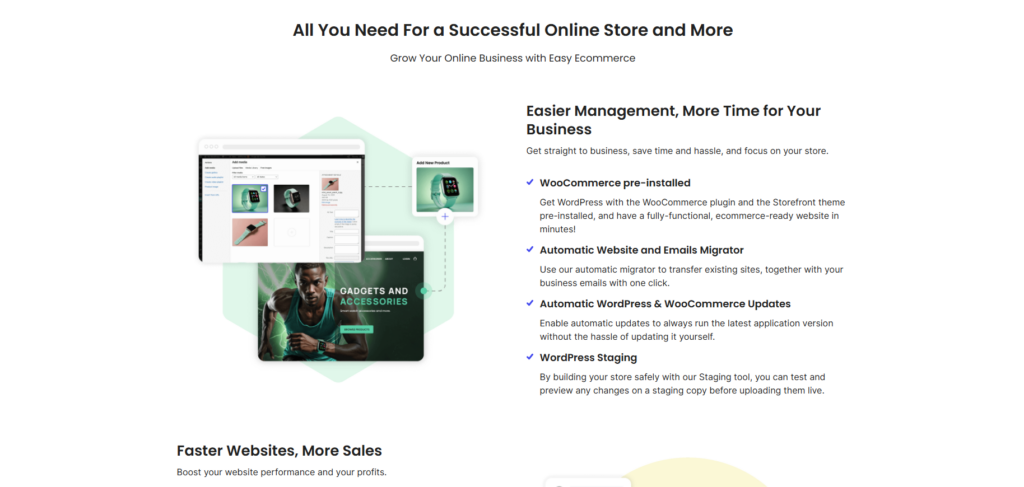
SiteGround is a popular choice for WooCommerce stores seeking a reliable host with a good balance of performance, features, affordability, and user-friendliness. Here’s what makes it stand out:
Solid Performance and Reliability
SiteGround delivers consistent performance thanks to its optimized infrastructure, including SSD storage, custom caching solutions, and a choice of data center locations. This translates to faster page load times and a smoother shopping experience for your customers. Studies show that SiteGround boasts an impressive 99.99% uptime average, demonstrating its reliability.
Excellent Customer Support
SiteGround is renowned for its top-notch support team. They offer 24/7 assistance via phone, live chat, and a ticketing system. Their knowledgeable agents are well-versed in WooCommerce and provide quick and helpful resolutions to any issues you may encounter. SiteGround consistently earns high customer satisfaction scores, often exceeding 95%.
User-Friendly Tools
SiteGround aims to make Web hosting accessible, even for those without extensive technical knowledge. Their intuitive control panel, one-click installers, and guided setup wizards streamline the process of managing your WooCommerce store.
Affordable Pricing
SiteGround offers competitive pricing, especially its introductory offers, making it a budget-friendly option for small and medium-sized WooCommerce stores. While renewal prices may be higher, they often have ongoing promotions and discounts.
When SiteGround Is a Good Fit:
- Small to Medium-Sized Stores: SiteGround provides ample resources and performance to power most small to medium-sized WooCommerce sites.
- Prioritizing Value: If you’re looking for a solid hosting experience without breaking the bank, SiteGround is a strong contender.
- Seeking User-Friendliness: SiteGround’s tools and support make it an excellent choice for those who want a hassle-free hosting experience.
#3: WP Engine – Developer-Friendly Powerhouse
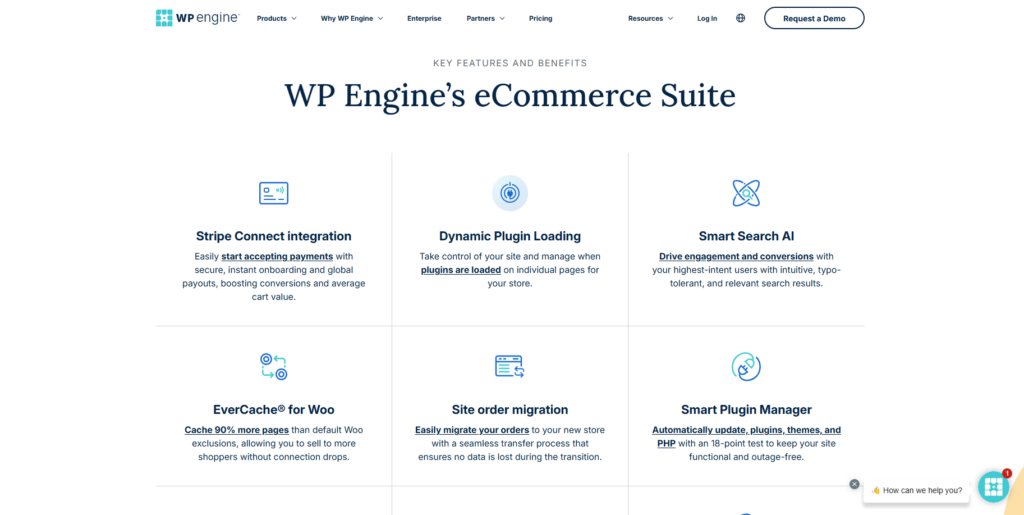
WP Engine is a premium managed WordPress hosting provider focused on high performance, scalability, and advanced developer tools. If you need the flexibility to customize your WooCommerce setup extensively, WP Engine is worth a serious look.
Top-Tier Performance
WP Engine’s infrastructure is fine-tuned for speed. Their use of high-end servers, custom caching mechanisms, and a global CDN ensure blazing-fast load times for your WooCommerce store. This performance boost enhances user experience and can positively impact your search rankings.
Developer-Centric Features
WP Engine empowers developers with tools like Git integration, SSH access, and one-click staging environments. These features streamline development workflows, allowing for seamless testing, code versioning, and deployment.
Robust Scalability
Whether you’re anticipating predictable growth or sudden traffic surges, WP Engine’s plans can effortlessly scale to accommodate increased demand. This means your store can handle busy shopping seasons or viral promotions without compromising on performance.
Security and Proactive Updates
WP Engine takes security seriously. They implement firewalls, malware scanning, and automatic plugin updates to protect your store from vulnerabilities. Their proactive approach minimizes downtime and gives you peace of mind.
When WP Engine Is the Right Choice
- Tech-Savvy Users: WP Engine’s advanced tools are best utilized by those with development experience or a dedicated technical team.
- High-Traffic Stores and Growing Businesses: WP Engine’s scalability and performance make it ideal for WooCommerce stores handling significant traffic or experiencing rapid growth.
- Needing Extensive Customization: If you require fine-grained control over your hosting environment, WP Engine provides the flexibility you need.
#4: Kinsta – Security at the Forefront
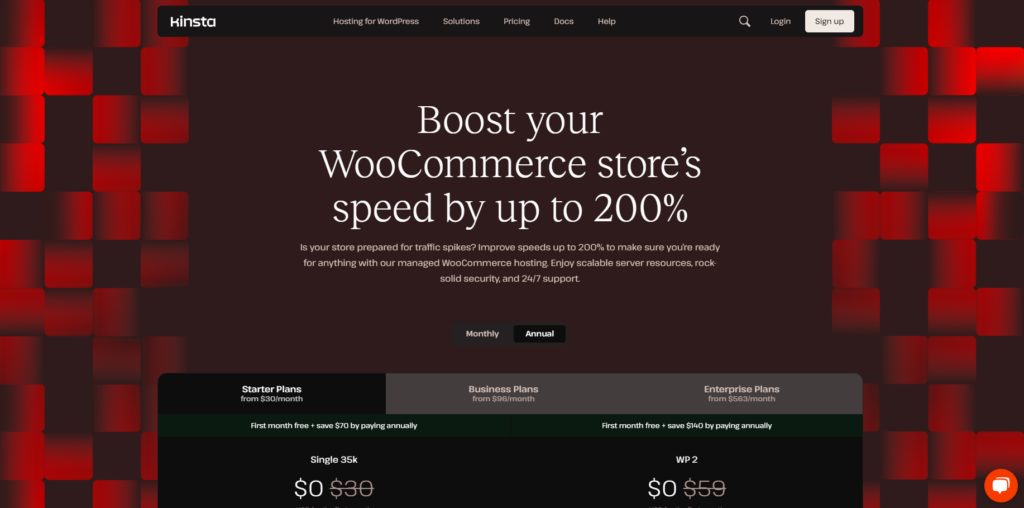
Kinsta prioritizes security above all else, making it an excellent choice for businesses handling sensitive customer data or those concerned about potential threats. Let’s delve into why it stands out for secure WooCommerce hosting.
Top-Notch Security Features
Kinsta employs a multi-layered security approach to protect your WooCommerce store:
- Google Cloud Platform’s Firewall: Their infrastructure blocks malicious traffic before it even reaches your site.
- Active and Passive Security Measures: Continuous monitoring detects attacks while software restrictions prevent exploits.
- Free Hack Fixes: If your site is compromised, Kinsta’s team will clean it up at no extra cost.
- Automatic Backups: Daily backups with multiple restore points ensure you can always revert to a safe version of your store.
Fast and Reliable Performance
Kinsta doesn’t sacrifice speed for security. They leverage Google Cloud’s premium network, isolated containers for each site, and a powerful caching system to deliver consistently fast load times for your customers.
Developer-Friendly Environment
Kinsta offers a range of developer tools that make managing your WooCommerce store easier and more efficient:
- Staging Environments: Safely test changes and updates before pushing them live.
- SSH Access: Secure access for advanced management and troubleshooting tasks.
- WP-CLI Integration: Interact with your site directly from the command line.
- Detailed Performance Monitoring: Identify bottlenecks and optimize your store for speed.
When Kinsta Is the Ideal Fit
- Security-Conscious Businesses: If protecting customer data and maintaining a secure online store is your top priority, Kinsta provides peace of mind.
- Stores Handling Sensitive Information: Kinsta’s robust security measures are well-suited for industries like healthcare, finance, or those handling credit card data directly.
- Tech-Savvy Users: While Kinsta offers support, its developer-oriented tools are best leveraged by those with some technical experience.
Kinsta’s focus on security generally comes with premium pricing compared to some other options.
#5: Nexcess (Liquid Web) – Scaling Made Simple
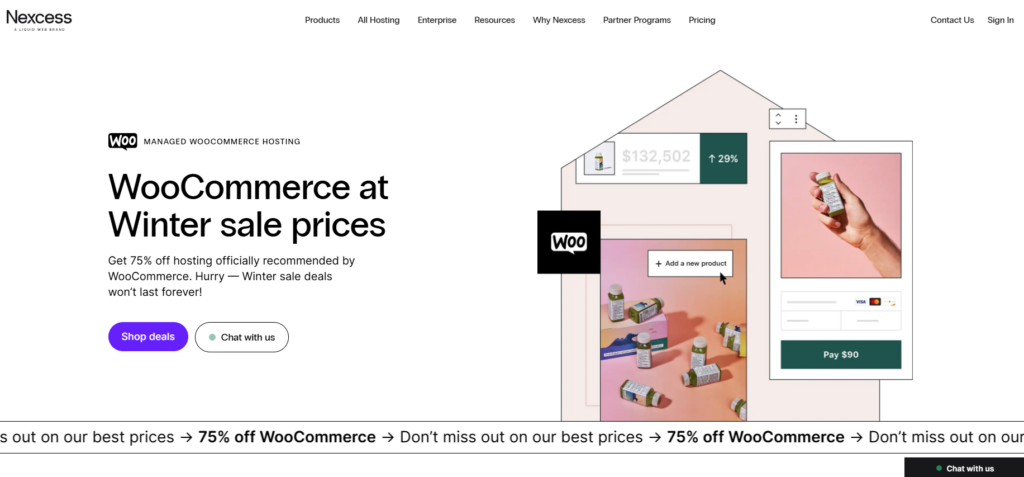
Nexcess, a subsidiary of Liquid Web, excels at providing flexible hosting plans that can effortlessly scale as your WooCommerce store grows. This makes it a wise choice if you anticipate rapid growth or unpredictable traffic patterns.
Flexible and Scalable Resources
Nexcess offers a range of plans, from those suitable for smaller stores to enterprise-level solutions. Upgrading your resources, such as RAM, CPU, and storage, is remarkably easy, often requiring just a few clicks within their control panel. This pay-as-you-go approach ensures you’re always paying for resources you don’t need.
Auto-Scaling for Traffic Surges
One of Nexcess’ unique features is built-in auto-scaling. When your site experiences sudden traffic spikes, it can automatically allocate additional resources to prevent slowdowns or crashes. This is especially valuable for seasonal businesses, stores running flash sales, or those expecting to be featured in media or viral campaigns.
Reliable Performance and Uptime
Nexcess maintains a strong track record of uptime, ensuring your store is accessible to customers 24/7. Their infrastructure is optimized for WooCommerce, with technologies like PHP 7+, SSD storage, and a built-in CDN to enhance your store’s speed.
When Nexcess Is a Smart Choice
- Rapid Growth: If you’re anticipating a surge in customers and orders, Nexcess’s scalability makes sure your hosting can keep up.
- Unpredictable Traffic: Their auto-scaling feature is a safety net for businesses with fluctuating traffic patterns.
- Resource-Intensive Stores: Nexcess provides the power you need for large WooCommerce stores with extensive product catalogs or complex features.
Important Considerations:
- Nexcess can be on the pricier side compared to some beginner-focused hosting providers.
- Support quality can sometimes be variable depending on the complexity of your issue.
#6: Bluehost – Budget-Conscious Performance
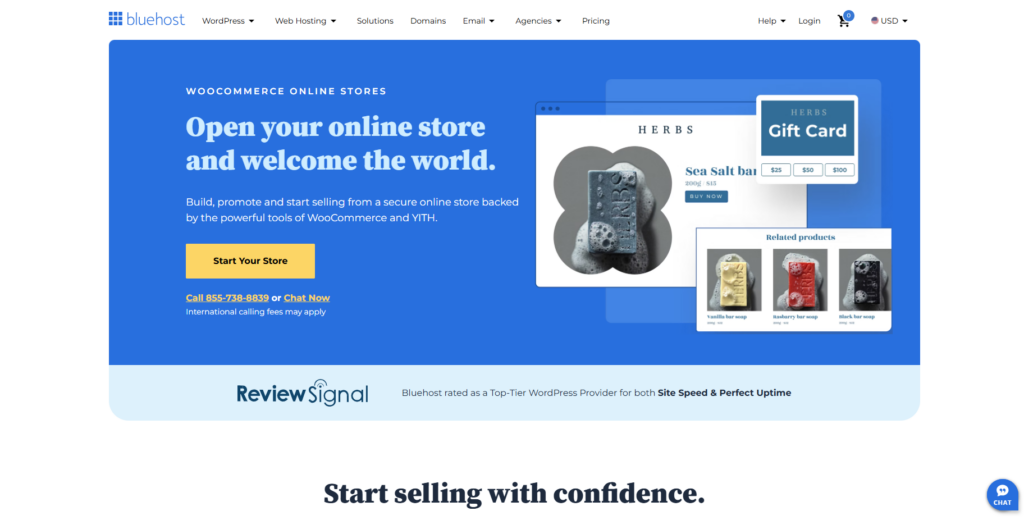
Bluehost is a popular and longstanding hosting provider, especially known for its affordability. If you’re starting a new WooCommerce store and want to keep costs low, Bluehost is worth considering.
Competitive Pricing
Bluehost often runs promotions and offers some of the most budget-friendly plans in the market. This makes it an attractive option for startups, solopreneurs, or those wanting to test the waters with WooCommerce before committing to a higher-priced host.
Beginner-Friendly Features
Bluehost aims to simplify web hosting with a user-friendly control panel and guided onboarding process. They provide one-click WordPress and WooCommerce installation, as well as access to free themes and plugins to help you get your store up and running quickly.
Free Domain Name
Many Bluehost plans include a free domain name registration for the first year. While domain names are relatively inexpensive, this can be a nice bonus, especially for brand-new businesses.
When Bluehost Is a Good Fit
- Tight Budget: If your primary concern is finding affordable hosting, Bluehost delivers value for its price.
- Small Stores: Bluehost’s resources can be sufficient for smaller WooCommerce stores with moderate traffic levels.
- New to WooCommerce: Their simplified tools and setup can be a good choice for those unfamiliar with building e-commerce websites.
Important Considerations:
- Performance Limitations: Shared hosting plans, which Bluehost primarily offers, can lead to slower load times as your store grows.
- Upselling: Be aware that Bluehost may frequently promote add-on services that you may not need.
#7: Cloudways – The Managed Hosting Advantage
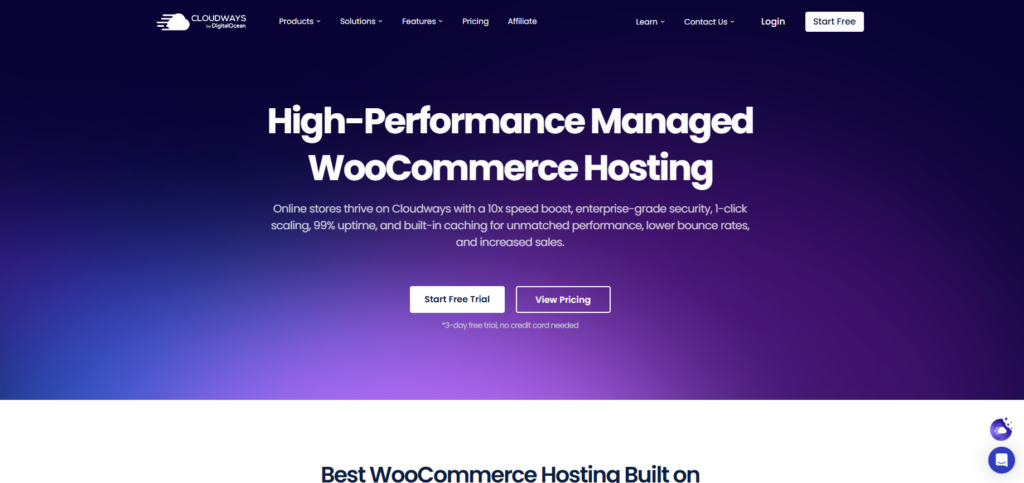
Cloudways offers a different approach to WooCommerce hosting, focusing on managed cloud hosting solutions. This translates to a more hands-off experience, where technical complexities are expertly handled for you.
Simplified Management
With Cloudways, you don’t have to worry about server configurations, software updates, or complex optimizations. Their intuitive platform and managed services take care of the technical heavy lifting, allowing you to focus on growing your business.
Choice of Cloud Providers
One of Cloudways’ unique advantages is flexibility. You can choose to deploy your WooCommerce store on top of popular cloud providers like Google Cloud, AWS, DigitalOcean, Linode, or Vultr. This allows you to select the provider that best suits your performance or budget needs.
Performance and Scalability
Cloudways prioritizes speed with features like built-in caching (Breeze), a dedicated CDN (CloudwaysCDN), and the ability to scale resources on demand seamlessly. Their infrastructure is designed to handle the dynamic demands of WooCommerce stores.
When Cloudways Is the Right Solution
- Lack of Technical Expertise: If you need an in-house developer or want to avoid server management, Cloudways provides a hassle-free experience.
- Focus on Performance: Cloudways offers excellent performance potential, especially for stores that utilize their advanced features and integrations.
- Desire for Flexibility: The ability to choose your cloud provider and easily upgrade resources offers granular control over your hosting environment.
Important Considerations
- Complexity for Beginners: Cloudways may have a steeper learning curve for those completely new to web hosting concepts.
- Pricing: Managed cloud hosting can be more expensive than traditional shared hosting options. Plans are often pay-as-you-go based on utilized resources.
#8: A2 Hosting – Global Reach
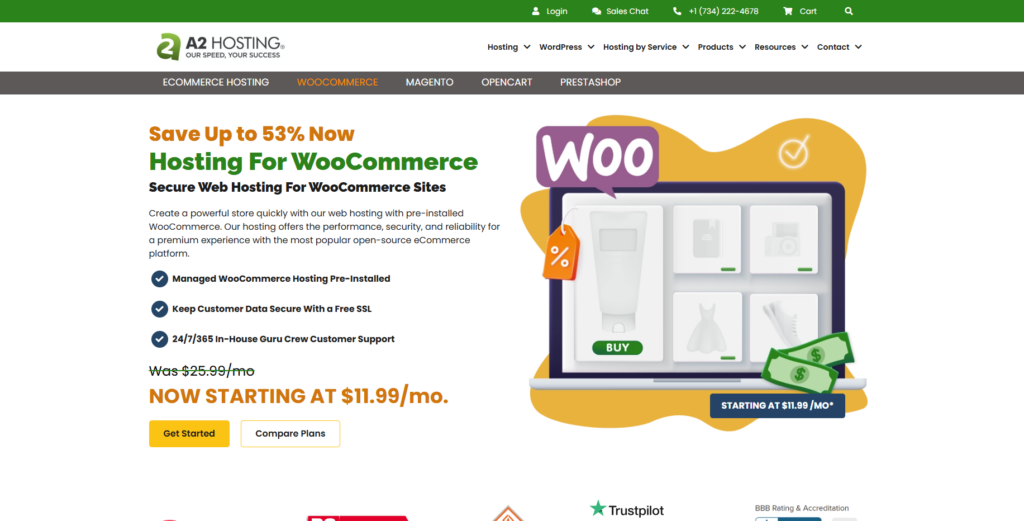
A2 Hosting stands out with its data centers strategically located across the globe and a focus on speed-optimized solutions. If your WooCommerce store targets an international audience, they’re worth a close look.
Data Centers on Multiple Continents
A2 Hosting allows you to choose a data center closest to your primary customer base. Its locations are in the USA, Europe, and Asia. This minimizes the physical distance data has to travel, resulting in faster load times for your international visitors.
Turbo Plans for Enhanced Speed
A2 Hosting offers “Turbo” plans that boast significant speed improvements over their traditional shared hosting. These plans utilize NVMe storage (much faster than HDD), fewer users per server, and have more resources allocated to them.
Developer-Friendly Options
While A2 Hosting has user-friendly features, it doesn’t shy away from offering more advanced tools. You’ll find SSH access, WP-CLI, staging sites, Git integration, and the ability to select your PHP version, catering to developers who need control over their environment.
When A2 Hosting Is Well-Suited
- International Customer Base: Their global data centers significantly improve load times for customers located far from your primary server location.
- Prioritizing Speed: A2 Hosting’s Turbo plans are designed to deliver a noticeable performance boost for your WooCommerce store.
- Needing Some Technical Control: A2 Hosting provides a good balance of beginner-friendly tools and developer-centric features.
Important Considerations:
- Mixed Support Reviews: A2 Hosting’s support quality can be inconsistent, with some users reporting excellent experiences and others facing longer wait times or less helpful resolutions.
- Higher Pricing: Some of their plans, especially the Turbo options, can be more expensive than other budget-focused providers.
#9: InMotion Hosting – Beginner-Friendly WooCommerce
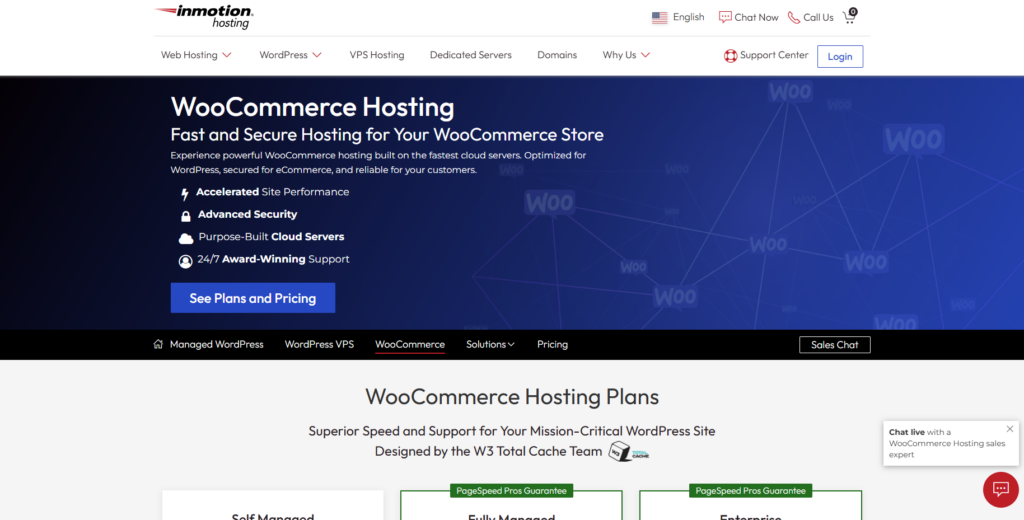
InMotion Hosting aims to make setting up and managing your WooCommerce store as easy as possible, making it a great option for those who are new to e-commerce or prefer a less technical approach.
User-Friendly Experience
InMotion Hosting provides an intuitive control panel (cPanel) and simplifies common tasks like setting up email accounts, managing databases, and installing WordPress and WooCommerce. Their onboarding process includes helpful guides and resources to get your store up and running quickly.
Free Website Migrations
If you’re moving an existing WooCommerce store to InMotion Hosting, they offer free website migrations. This service can save you significant time and hassle, especially if you need to be more comfortable with the technical aspects of website transfers.
Solid Performance and Value
InMotion Hosting delivers a good balance of performance, features, and affordability. While its plans may not match the most cutting-edge performance options, they offer ample resources for many small—to medium-sized WooCommerce stores.
When InMotion Hosting Is a Good Fit
- New to E-commerce: Their user-friendly approach and guided setup make InMotion Hosting an excellent choice for beginners.
- Ease of Use as Priority: If you value simplicity and want a host that minimizes technical hurdles, InMotion Hosting delivers.
- Seeking Value: Their competitive pricing and included features make it a good option for those seeking a well-rounded hosting package.
Important Considerations:
- Performance Limits for High-Traffic: During peak traffic, stores may encounter limitations when using InMotion’s shared hosting plans.
- Advanced Features: InMotion Hosting may need more of the developer-centric tools and granular controls found on more specialized hosts.
Key Features to Look for in WooCommerce Hosting
Performance Essentials
The performance of your WooCommerce store is directly influenced by the hosting you choose. It’s crucial to understand these key performance factors:
Server Type: The foundational choice will be between shared, VPS (Virtual Private Server), dedicated, and cloud hosting environments.
- Shared hosting is the most budget-friendly, but your website shares resources with others, often compromising speed.
- VPS offers a step up with more isolated resources and better handling of growing stores.
- Dedicated servers give you complete control over an entire machine but come with the highest price tag.
- Cloud hosting is known for scalability and reliability. Resources are pulled from a network of servers, making it ideal for traffic fluctuations.
RAM and CPU: RAM (Random Access Memory) allows your server to store data in use, while the CPU (Central Processing Unit) handles calculations and operations. Higher amounts of both ensure your WooCommerce store can process orders, load product pages, and handle customer interactions with snappy responsiveness.
RAM:
- A typical WooCommerce store should start with at least 2GB of RAM.expand_more Sites with high traffic or many products may need 4GB or even 8GB to function optimally.
- Studies show that increasing RAM can directly lead to a decrease in page load times by up to 30%, especially for sites with complex functionality.
CPU:
- For most small to medium WooCommerce sites, 2 CPU cores will suffice.
- High-traffic stores, or stores with resource-intensive plugins, may benefit from 4 or more cores.
- Benchmarks indicate that WooCommerce performance can improve by 15-20% with additional CPU cores during peak usage periods.
These are baseline recommendations. The optimal RAM and CPU for your WooCommerce store will depend on your specific traffic, product count, plugins used, and site design.
Storage (SSD vs. HDD): Solid State Drives (SSDs) dramatically outperform traditional Hard Disk Drives (HDDs) in terms of read and write speeds. This translates to faster loading times across all aspects of your WooCommerce store. For example, SSDs can be up to 10-20x faster than HDDs in sequential read/write operations and boast significantly faster random access times as well. This means your website pages, product images, and overall customer experience will be much more responsive.
CDN Integration: A Content Delivery Network (CDN) replicates your website’s content on servers around the globe. With a CDN, visitors connect to the nearest server, significantly reducing load times, especially for an international audience. Studies show CDNs can decrease page load times by 50% or more. Globally, the benefits become even more pronounced – users in regions far from your primary server can experience speed improvements of several hundred percent.
Caching Mechanisms: Caching is essential for performance. Look for hosts that implement object caching (storing database queries) and browser caching (storing static files locally on a user’s device). Combined, they reduce the number of times your server has to work to serve the same content repeatedly. Object caching can improve database query response times by up to 1000%, dramatically boosting your website’s speed. Browser caching keeps static elements of your site local, meaning subsequent page loads use already-downloaded assets, further improving loading times.
Security Best Practices
Protecting your WooCommerce store and, more importantly, your customer’s sensitive data is of paramount importance. Here are the security features you should prioritize when choosing a host:
- SSL Certificates: SSL (Secure Sockets Layer) is the technology that encrypts the connection between a visitor’s browser and your website. This safeguards data like credit card numbers and addresses when transmitted during the checkout process. Look for hosts that include free SSL certificates or offer easy integration with services like Let’s Encrypt.
- Malware Scanning and Firewalls: Proactive malware scanning can detect malicious code or compromised files on your website. Your host should offer firewalls to block bad traffic and prevent common web-based attacks.
- Backup and Restore Policies: Regular backups are your safety net in case of a hack, data corruption, or accidental changes. Choose a host that provides automated backups and easy ways to restore previous versions of your store.
- Proactive Updates: Outdated versions of WordPress, WooCommerce, plugins, or themes are prime targets for hackers. Look for hosts that automatically update core software or provide clear instructions and tools for managing updates yourself.
Beyond the Basics
Some hosting providers go the extra mile to secure your WooCommerce store. Look for features like:
- Two-Factor Authentication (2FA) for Logins: 2FA adds an extra layer of protection by requiring a time-sensitive code in addition to your password.
- Security Monitoring: Hosts may actively monitor your site for suspicious activity or intrusion attempts, alerting you to potential threats.
- Security Expertise: A dedicated security team at your hosting provider can be invaluable in proactively securing your store and responding quickly to any incidents.
Reliability: Keeping Your Store Online and Open for Business
Downtime for your WooCommerce store means lost sales, frustrated customers, and potential damage to your brand’s reputation. Look for hosting providers that prioritize reliability and uptime. Here’s what to consider:
- Uptime Guarantees: Most reputable hosts offer uptime guarantees, often around 99.9% or higher. This means they guarantee your store will be accessible for that percentage of the time each month. Look for transparency in their uptime reporting so you can track their performance.
- Redundancy: A reliable hosting setup should have redundancy built in. This means that if one server fails, another one seamlessly takes over, minimizing downtime. Ask about the host’s redundancy measures.
- Monitoring: Proactive monitoring systems can detect issues before they lead to significant outages. Your host should have robust monitoring tools in place to identify and address problems quickly.
- Hardware Quality: Hosts that invest in top-tier hardware (servers, network infrastructure) are less likely to experience failures, ensuring a more reliable experience for your store.
- Network Infrastructure: A well-connected network with multiple data center locations helps maintain the accessibility of your store even if there’s a localized internet outage.
Proactive Maintenance
Reliable hosts don’t just react to problems; they prevent them. Look for providers that:
- Regularly Update Software: Updates often contain critical security patches and performance improvements, reducing the risk of downtime.
- Perform Preventative Maintenance: Proactive checks and optimizations of their infrastructure can minimize unexpected outages.
Scalability: Handling the Ups and Downs of E-commerce Traffic
Your WooCommerce store’s traffic will remain dynamic. It’s crucial to choose a hosting solution that can scale with your business, ensuring smooth operations even during unexpected traffic surges.
- Flexible Resources: Look for hosts that make it easy to upgrade your RAM, CPU, storage, and bandwidth as needed. Ideally, this should be a seamless process that does not require significant downtime or complex migrations.
- Cloud Hosting: Cloud-based solutions are inherently scalable. They can allocate additional resources almost instantly to handle traffic spikes, ensuring your store stays responsive.
- Load Balancing: This technology distributes incoming traffic across multiple servers, preventing any single server from becoming overwhelmed. Load balancing is especially important for high-traffic stores.
- Auto-Scaling: Some hosts offer auto-scaling features, where resources are dynamically adjusted based on real-time traffic demands. This can be cost-effective as you only pay for what you need during peak periods.
Why Scalability Matters
Investing in scalable hosting offers several benefits:
- Maintain Performance during Peak Traffic: Avoid slowdowns or crashes during holidays, sales, or viral marketing campaigns.
- Lost Sales Prevention: Ensure potential customers can always access your store, even during high demand.
- Improved Customer Experience: A consistently fast and responsive store keeps shoppers happy and more likely to return.
- Long-Term Planning: Scalable hosting allows you to accommodate your store’s growth without major infrastructure changes.
Support: Your Partner in Success
When questions arise, issues occur, or you need guidance optimizing your WooCommerce store, the quality of your hosting provider’s support can make a world of difference. Here’s what to look for:
- WooCommerce Expertise: Ideally, the support team should have in-depth knowledge of WooCommerce’s unique features, common problems, and troubleshooting techniques. This ensures they can resolve issues quickly and effectively.
- 24/7 Availability: E-commerce never sleeps, so look for hosts offering round-the-clock support. When issues arise, you want the peace of mind that help is available whenever you need it.
- Multiple Channels: Phone, live chat, email, and ticketing systems offer flexibility in how you contact support. Choose a provider with channels that match your preferred communication style.
- Response Times: Fast response times are crucial, especially for urgent issues that can impact sales. Look for hosts that advertise their average response times and check online reviews for confirmation.
- Knowledge Base and Documentation: A comprehensive knowledge base with tutorials, FAQs, and troubleshooting guides can empower you to solve common problems independently, allowing you to get answers even faster.
Beyond Technical Support
Some hosts go above and beyond:
- Proactive Guidance: Hosts may offer advice on optimizing your store, enhancing security, or utilizing their platform to its fullest potential.
- Developer-Friendly Support: If you have a developer on your team, ensure the host can provide support that caters to their technical skill level.
Additional Considerations
The best hosting fit for your business depends on the size and nature of your WooCommerce store. Consider these factors:
- Small Business vs. Enterprise: Shared hosting plans or entry-level VPS solutions might suit smaller stores, while dedicated servers or scalable cloud hosting may be required for large, high-traffic stores.
- Technical Expertise: If you’re a beginner, look for hosts offering user-friendly control panels and guided setups. Experienced developers and tech-savvy users may prioritize flexibility, granular control, and advanced developer tools.
- Anticipated Growth: If you expect your store to grow rapidly, consider the scalability of different hosting providers and plans. Choose a solution that can effortlessly accommodate increased traffic and product offerings. Studies show that approximately 75% of WooCommerce stores experience significant growth within the first two years of operation.
WooCommerce Extensions Compatibility
Many WooCommerce stores rely on extensions to add essential features like payment gateways, shipping options, marketing tools, and more. Here’s the key question:
Does Your Host Support Essential Extensions? Some hosts may have restrictions or performance limitations with certain plugins or extensions. Check with potential hosts beforehand to ensure compatibility with the extensions critical to your store’s functionality.
SEO Considerations
While hosting is just one factor in your store’s SEO (Search Engine Optimization), it can still play a role. Here’s what to keep in mind:
- Speed: Fast-loading websites tend to rank better in search results. Ensure your host prioritizes performance to give your store an SEO advantage.
- Uptime: Search engines may penalize websites that are frequently offline. Choose a reliable host with high uptime to avoid potential SEO setbacks.
- Global Reach: If you’re targeting international customers, consider a host with data centers in multiple regions or integrates seamlessly with a powerful CDN.
Conclusion
Choosing the right WooCommerce hosting provider is a crucial decision that impacts the success of your online store. Studies show that slow-loading websites can have a conversion rate decrease of up to 7% per second of delay. While there’s no one-size-fits-all answer, this guide has equipped you with the knowledge to make an informed choice.
Remember to prioritize performance, security, reliability, scalability, support, ease of use, and pricing. Security breaches can be incredibly costly – the average cost of a data breach in 2023 was $4.35 million. These factors should be carefully weighed against the specific needs of your WooCommerce store, your budget, and your technical expertise.
If design flexibility and a seamless website-building experience are your top priorities, consider the potential benefits of Elementor WooCommerce Hosting. Its integration with Elementor Pro, premium Google Cloud infrastructure, and Cloudflare Enterprise CDN provides a powerful foundation for building a visually stunning, secure, and high-performing store.
Ultimately, the best WooCommerce hosting provider empowers you to create a successful online business. By understanding the key considerations outlined in this guide, you’ll be well-positioned to find the perfect hosting solution and propel your WooCommerce store toward growth and success.
FAQs
What specific performance metrics should WooCommerce store owners prioritize when choosing a hosting provider, and what are considered good target values for these metrics?
When evaluating WooCommerce hosting performance, focusing on metrics that directly impact user experience and conversion rates is crucial. Key metrics include:
- Time to First Byte (TTFB): This measures the responsiveness of the hosting server. Ideally, TTFB should be under 100-200ms. A slow TTFB indicates server-side delays.
- Largest Contentful Paint (LCP): LCP reflects how quickly the main content of a page loads. For a good user experience, aim for an LCP under 2.5 seconds. WooCommerce stores with many product images or complex layouts should especially monitor this.
- First Input Delay (FID): FID measures the time it takes for a page to become interactive. Strive for an FID of less than 100ms. This is important for WooCommerce stores where users frequently interact with elements like buttons and forms.
- Page Load Time: While not as specific as the above metrics, overall page load time is still important. Aim for a fully loaded page in under 3 seconds, especially on mobile devices.
Tools like WebPageTest, GTmetrix, and Google PageSpeed Insights can be used to measure these metrics. Consistently monitoring these performance indicators helps ensure a fast and responsive WooCommerce store.
Beyond SSL certificates, what specific security features should a robust WooCommerce hosting provider offer to protect online stores and customer data?
While SSL certificates are essential, comprehensive WooCommerce hosting security goes far beyond basic encryption. Look for providers offering:
- Web Application Firewall (WAF): A WAF protects your store from common web attacks like SQL injection, cross-site scripting (XSS), and DDoS attacks by filtering malicious traffic before it reaches your server.
- Malware Scanning and Removal: Regular malware scans and automated removal are vital to detect and eliminate threats before they compromise your store and customer data.
- DDoS Protection: Distributed Denial of Service (DDoS) attacks can overwhelm your server and make your store unavailable. Robust DDoS protection mitigates these attacks, ensuring uptime.
- Regular Backups: Automated daily or even hourly backups are crucial for disaster recovery. Ensure the provider offers easy restoration options. Offsite backups add an extra layer of protection.
- Security Hardening: This includes proactive measures taken by the hosting provider to secure their servers, such as নিয়মিত security audits, intrusion detection systems, and keeping software up to date.
- Two-Factor Authentication (2FA): For accessing your hosting account, 2FA adds an extra layer of security beyond passwords.
Choosing a provider with these security features minimizes vulnerabilities and protects your WooCommerce store and sensitive customer information.
How do scalability challenges differ for WooCommerce stores compared to regular websites, and what hosting features specifically address these challenges?
WooCommerce stores, especially those experiencing growth, face unique scalability challenges compared to static websites or blogs. These stem from:
- Dynamic Content and Database Demands: WooCommerce is database-driven, with every product page, category, and customer interaction requiring database queries. Traffic spikes can heavily strain database resources.
- E-commerce Transactions: Processing orders, managing inventory, and handling payments add significant server load, particularly during peak shopping seasons or promotions.
- Customer Accounts and Personalization: User accounts, order history, and personalized recommendations require more server resources than serving static content.
To address these, WooCommerce hosting should offer:
- Auto-scaling: Automatically adjusts server resources (CPU, RAM) based on traffic demand, ensuring your store remains responsive during peak loads without manual intervention.
- Containerization (e.g., Docker, Kubernetes): Allows for efficient resource allocation and faster scaling by isolating applications and their dependencies.
- Content Delivery Network (CDN): Distributes static content (images, CSS, JavaScript) across geographically dispersed servers, reducing latency for global customers and offloading bandwidth from the origin server.
- Optimized Database Management: Hosting optimized for MySQL or MariaDB, with features like database caching and efficient query processing, is essential for WooCommerce.
- Server-level Caching: Implementations like Varnish, Memcached, or Redis cache frequently accessed data in server memory, significantly speeding up page load times and reducing database load.
These scalability features ensure your WooCommerce store can handle increasing traffic and transactions without performance degradation.
Why is a staging environment particularly important for WooCommerce stores, and what features should store owners look for in a hosting provider’s staging tools?
A staging environment is not just a “nice-to-have” for WooCommerce, it’s a critical necessity. Due to the dynamic and transactional nature of e-commerce stores, testing changes in a live environment is risky. Staging environments are crucial because:
- Safe Testing of Updates and Changes: WooCommerce stores frequently require plugin updates, theme modifications, and code changes. Staging allows you to test these thoroughly without risking downtime or breaking your live store.
- Preventing Order Disruptions: Testing payment gateway integrations, shipping configurations, or significant product catalog changes in staging ensures a smooth customer experience and prevents order processing errors in the live store.
- Theme and Design Modifications: Experiment with new themes or design changes in staging to ensure visual appeal and functionality before pushing them live.
- Troubleshooting and Debugging: Staging provides a safe space to diagnose and fix issues without impacting the live customer experience.
When choosing a hosting provider, look for staging tools that offer:
- One-Click Staging: Easy and quick creation of staging sites with a single click, simplifying the workflow.
- Seamless Synchronization: Simple mechanisms to copy data from live to staging and push changes from staging to live, including database and files.
- Password Protection: Ability to password-protect staging sites to prevent public access during development.
- Isolated Environment: Staging environments should be completely isolated from the live site to avoid accidental data corruption or conflicts.
A well-implemented staging environment significantly reduces risks associated with updates and changes to your WooCommerce store.
For WooCommerce store owners who require customization and development flexibility, what developer-friendly hosting features are most valuable?
WooCommerce’s open-source nature encourages customization. For developers and store owners who plan to modify their stores, certain hosting features become essential:
- SSH Access: Secure Shell (SSH) access allows direct command-line control over the server, enabling advanced tasks like file management, server configuration, and running scripts.
- WP-CLI (WordPress Command Line Interface): WP-CLI provides a command-line interface for managing WordPress and WooCommerce, streamlining tasks like plugin/theme updates, database management, and more.
- Git Integration: Integration with Git version control systems facilitates efficient code management, collaboration, and rollback capabilities for customized themes and plugins.
- PHP Version Control: The ability to choose and easily switch PHP versions allows developers to test compatibility with different WooCommerce extensions and optimize performance.
- Access to Server Logs: Error logs and access logs are invaluable for debugging issues and monitoring website activity.
- Cron Job Management: For scheduling automated tasks like database optimization, backups, or custom scripts, cron job access is necessary.
Providers offering these developer-centric features empower users to customize and manage their WooCommerce stores effectively.
What is the difference between managed and unmanaged WooCommerce hosting, and which type is generally more suitable for different types of store owners?
The distinction between managed and unmanaged WooCommerce hosting is crucial and impacts the level of technical expertise and responsibility required from the store owner:
- Unmanaged WooCommerce Hosting (e.g., VPS, Cloud Servers):
- Control: Offers complete control over the server environment, including operating system, software installations, and configurations.
- Responsibility: Requires significant technical expertise to manage server security, updates, performance optimization, and troubleshooting. The store owner is responsible for almost everything server-related.
- Cost: Can be cheaper in terms of raw server resources, but hidden costs can arise from the need for technical staff or time spent on server management.
- Suitable for: Highly technical users, developers, or those with dedicated server administration teams who need maximum control and customization and are comfortable with server management tasks.
- Managed WooCommerce Hosting:
- Ease of Use: Focuses on simplifying WooCommerce management. The hosting provider handles server setup, security, performance optimization, backups, and often WooCommerce-specific configurations and support.
- Less Technical Expertise Required: Ideal for store owners who want to focus on their business rather than server administration.
- Support: Typically includes specialized WooCommerce support teams who understand the platform and its common issues.
- Cost: Generally more expensive than unmanaged hosting due to the added services and management.
- Suitable for: Most WooCommerce store owners, especially those without strong technical skills or who prefer to outsource server management to focus on business growth.
For the majority of WooCommerce store owners, managed hosting is the recommended choice due to its ease of use, specialized support, and focus on performance and security, allowing them to concentrate on running their online business. Unmanaged hosting is best suited for technically advanced users with specific server configuration needs and the expertise to manage it effectively.
Looking for fresh content?
By entering your email, you agree to receive Elementor emails, including marketing emails,
and agree to our Terms & Conditions and Privacy Policy.

